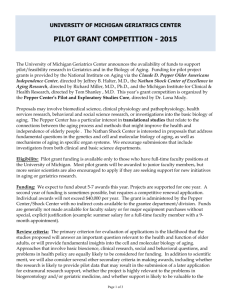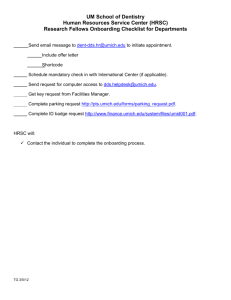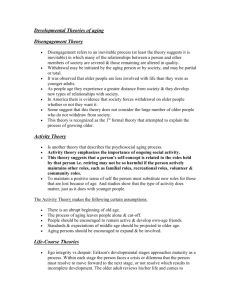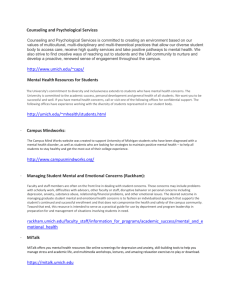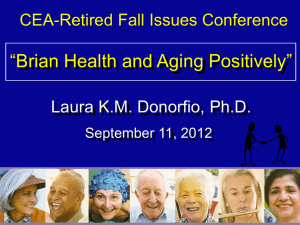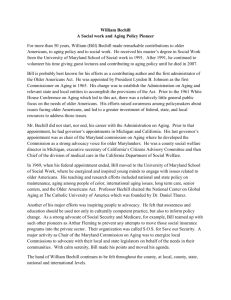UNIVERSITY OF MICHIGAN GERIATRICS CENTER PILOT GRANT
advertisement
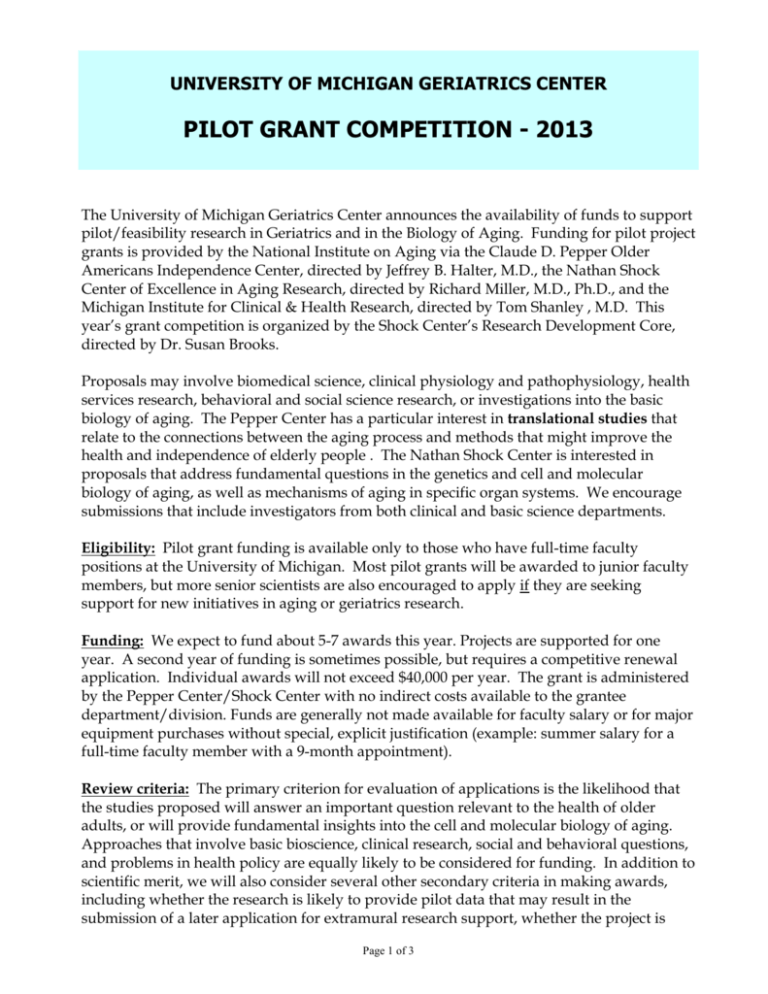
UNIVERSITY OF MICHIGAN GERIATRICS CENTER PILOT GRANT COMPETITION - 2013 The University of Michigan Geriatrics Center announces the availability of funds to support pilot/feasibility research in Geriatrics and in the Biology of Aging. Funding for pilot project grants is provided by the National Institute on Aging via the Claude D. Pepper Older Americans Independence Center, directed by Jeffrey B. Halter, M.D., the Nathan Shock Center of Excellence in Aging Research, directed by Richard Miller, M.D., Ph.D., and the Michigan Institute for Clinical & Health Research, directed by Tom Shanley , M.D. This year’s grant competition is organized by the Shock Center’s Research Development Core, directed by Dr. Susan Brooks. Proposals may involve biomedical science, clinical physiology and pathophysiology, health services research, behavioral and social science research, or investigations into the basic biology of aging. The Pepper Center has a particular interest in translational studies that relate to the connections between the aging process and methods that might improve the health and independence of elderly people . The Nathan Shock Center is interested in proposals that address fundamental questions in the genetics and cell and molecular biology of aging, as well as mechanisms of aging in specific organ systems. We encourage submissions that include investigators from both clinical and basic science departments. Eligibility: Pilot grant funding is available only to those who have full-time faculty positions at the University of Michigan. Most pilot grants will be awarded to junior faculty members, but more senior scientists are also encouraged to apply if they are seeking support for new initiatives in aging or geriatrics research. Funding: We expect to fund about 5-7 awards this year. Projects are supported for one year. A second year of funding is sometimes possible, but requires a competitive renewal application. Individual awards will not exceed $40,000 per year. The grant is administered by the Pepper Center/Shock Center with no indirect costs available to the grantee department/division. Funds are generally not made available for faculty salary or for major equipment purchases without special, explicit justification (example: summer salary for a full-time faculty member with a 9-month appointment). Review criteria: The primary criterion for evaluation of applications is the likelihood that the studies proposed will answer an important question relevant to the health of older adults, or will provide fundamental insights into the cell and molecular biology of aging. Approaches that involve basic bioscience, clinical research, social and behavioral questions, and problems in health policy are equally likely to be considered for funding. In addition to scientific merit, we will also consider several other secondary criteria in making awards, including whether the research is likely to provide pilot data that may result in the submission of a later application for extramural research support, whether the project is Page 1 of 3 highly relevant to the problems in biogerontology and/or geriatric medicine, and whether support is likely to be valuable to the applicant in developing a career as an independent scientist committed to research in aging and its cognate fields. Most, but not all, awards typically go to faculty members who have not yet reached the rank of Associate Professor. Interactions with Center Research Cores: Successful applicants are eligible to make use of resources provided by the Research Resources Cores available within the Nathan Shock and Pepper Center programs. The Nathan Shock Center sponsors core facilities that include an Aging Rodent Core, a Drosophila Aging Core, a Comparative Biogerontology Core, and a Functional Assessment Core. Pepper Center programs include the Biomechanics Core, Core Facility for Aged Rodents, Methodology, Data Management and Analysis Core, and Human Subjects and Assessment Core. Applicants are encouraged to discuss their project during its development with relevant Core directors, who may be able to provide access to resources without cost to the applicant. Additional information on the Centers’ Core resources, including contact information for Core Directors who can assist with development of pilot grant applications, can be found at: http://www.med.umich.edu/geriatrics/research/pepper.htm http://sitemaker.umich.edu/nsc/home Application Procedure: Individuals interested in obtaining applications should contact Jane Heibel (jheibel@umich.edu). Completed applications, in the form of a PDF or Word DOC file, must be submitted to Ms. Heibel, to arrive no later than 4 pm on February 11th, 2013. All applications will be reviewed for scientific merit by ad hoc peer reviewers selected from outside the University of Michigan, and then by the Geriatrics Center Research Operating Committee and the Nathan Shock Center Steering Committee for relevance to each Center’s thematic goals. Applicants will be notified of the funding decision by the end of June, 2013, with funding likely to be available by August 1, 2013. Questions regarding the Pilot Grants relating to the Pepper Center should be addressed to Dr. Lona Mody (lonamody@umich.edu). Questions relating to the Shock Center should be addressed to Dr. Susan Brooks via email to svbrooks@umich.edu. Page 2 of 3 Supplementary Information Geriatrics Center 2013 Pilot Grant Program Recipients of Pilot Grant awards are eligible to make full use of the Centers’ sets of Research Resource Cores. While developing their plans, applicants are urged to contact the Director(s) of any of the relevant Cores for advice and information about services that might be of use to the project. Pepper Center Research Resource Cores: Human Subjects & Assessment Core: maintains a database of elderly individuals who have volunteered to participate in research studies. Can provide screening data and/or contacts with elderly volunteers, and assist in assessment of functional outcomes of interventions. Contact: Ray Yung, ryung@umich.edu and Jersey Liang, 936-1303, jliang@umich.edu. Biomechanics Core: provides techniques and equipment for quantification of physical functioning. Resources include sophisticated instrumentation for assessment of position, movement, and torque; assistance with computer modeling of the elements of motor acts; and guidance in the development of research protocols in geriatric biomechanics. Contact: James Ashton-Miller, 763-2320, jaam@umich.edu. Core Facility for Aged Rodents: provides guidance in the selection of strains, ages, and species for analysis of aging and disease in rodent models. Contact: Rich Miller, 936-2122, millerr@umich.edu. Methodology, Data Management, and Analysis Core: provides advice and assistance in study design, utilization and construction of databases, and statistical analysis. Services range from brief consultation to full-scale collaboration in selected cases. Contact: Andrzej Galecki, 936-2138, aglecki@umich.edu. Nathan Shock Center Research Resource Cores: Aging Rodent Core: provides support for the cost of producing new transgenic and knockout mice, and support for the per diem expenses of maintaining mice until they are old enough for experimental use. Contact: Evan Keller, 615-0280, etkeller@umich.edu. Drosophila Aging Core: will provide advice, technical assistance, and specialized facilities to Drosophila experts new to aging research. It will also collaborate with experienced biogerontologists, new to work on flies, who now wish to exploit the genetic potential of Drosophila to test molecular hypotheses or screen for mutants or drugs with specific properties of interest. Lastly, it can provide highly specialized protocols and equipment to support sophisticated studies of aging flies that would be difficult to conduct in less sophisticated facilities. Contact: Scott Pletcher, spletch@umich.edu. The Comparative Biogerontology Core: can provide cell lines from multiple species of longlived and short-lived rodents, primates, birds, and bats, for studies of cellular properties that may contribute to differences among species in aging rates and disease susceptibility. Contact: Rich Miller, 936-2122, millerr@umich.edu. The Functional Assessment Core: can provide subsidies to UM faculty who wish to study problems in biogerontology using any of the university's biomedical support cores, including the Center for Integrative Genetics, the Metabolomics and Obesity Core, the Microscopy and Image Analysis laboratory, the DNA Sequencing Core, the Flow Cytometry laboratory, and many others. Contact: Greg Cartee, 615-3458, gcartee@umich.edu. Page 3 of 3
